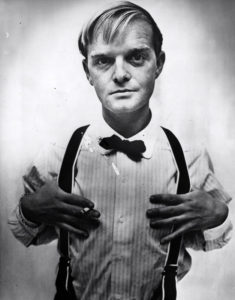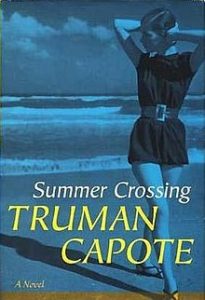Teenage Mutant Ninja Capote
Appeared in the Orlando Sentinel, October 23, 2005
Those last 20 years of Truman Capote’s life were tragic. He spent most of his post-In Cold Blood years living on the reputation and royalties of that book, reclining on talk-show couches, declining into a world of drug and alcohol abuse and becoming known as that Kewpie-voiced man who was merely famous for being famous. Sad, when a caricature overshadows an artist.

So here is something from the first 20 years of Capote’s life – a novel begun when he was 19. The manuscript was long thought to be lost in the attic of the Brooklyn home that Capote gave up in the mid-1960s – when the wealth his non-fiction masterpiece, In Cold Blood, allowed him to move to a prestigious Manhattan address. And this slim book, Summer Crossing, reminds us that before he became an innovative literary journalist, and before he became the talk-show and disco cartoon, he wrote magnificent fiction. As a prodigy, he published classic stories such as “A Christmas Memory” and “Miriam” and brilliant short novels, such as Other Voices, Other Rooms and Breakfast at Tiffany’s. Squarely in the tradition of great Southern writers – he could hold his own with Flannery O’Connor and Eudora Welty – Capote seemed restless by the mid-1950s and began experimenting with journalism, culminating in what he called “a new art form,” the non-fiction novel In Cold Blood. That book told the story of a multiple murder and its consequences. Written with the insight of a great novelist, it was a breakthrough in journalism from which Capote never recovered. In the wake of that book and his monstrous celebrity, he never again published a major work.
So it’s nice to return to the beginning, when he was a precocious, beautiful young man full of promise in postwar New York.

Summer Crossing is the story of a privileged young woman left to tend her parents’ Manhattan apartment for the summer while her folks go to Europe to assess the war damage to their villa. Left alone, Grady McNeil eschews the logical and parent-approved future husband – charmingly arrogant Peter Bell – for a lowlife parking-lot attendant named Clyde Manzer. A man of modest means, Jewish, void of ambition – Clyde is all of the things Grady’s parents abhor. Yet she is mad for him, despite – or perhaps because of – his indifference to her. He’s back from the war and finds her upper-class debutante life innocuous and boring. Secure in his skin, Clyde’s not out for anything but himself and finds the pretensions of Grady’s society boring.
But of course, all of this makes Clyde irresistible. Relatively innocent of sex, Grady is drawn to Clyde’s raw power and also finds him a perfect vehicle for the rebellion from her tightly controlled society. Though Capote was gay and this story is far from autobiographical, it still conveys the kid-in-a-candy-store feeling he must have had as a poor young Alabama transplant in the New York society which found him so amusing for so many years. (Amusing, that is, until he started spilling secrets of the rich and famous in his last, and unfinished book, Answered Prayers.)
Summer Crossing does not have a remarkable or original plot and it has the feeling of a developed sketch rather than a fully realized novel. Still, the book is more than a historical or literary curiosity. It’s our earliest look at Truman Capote and we see that he was nearly fully formed as a writer at an early age. Consider the circumstances of his Dickensian childhood – abandoned by an absent father and a social-climber mother, shuffled off to live with relatives. The only child in a house full of mostly unfriendly relatives, he paired off with his mildly retarded, elderly cousin and learned storytelling as a way to amuse the one friend he had.
Those gifts Capote developed as a boy stayed with him his whole life, which ended as it began – abandoned, this time by the high-society friends offended by the little bit of Answered Prayers published in the 1970s. In Summer Crossing, Capote shows the fascination with the wealthy that young Scott Fitzgerald displayed in his Jazz Age stories and though not fully realized, the Capote book is another example of the talent of this great and tormented man.
